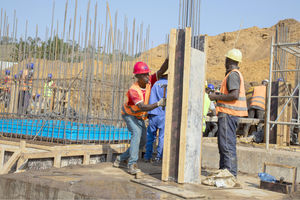Mozambicans pay dearly for a president’s financial mistake

An election poster ahead of past elections in Mozambique. PHOTO | FILE
What you need to know:
- The scandal involved loans amounting to $2 billion – roughly equivalent to one third of the national budget – to build a tuna fishing fleet and buy maritime security vessels in 2013 and 2014. The problem was those loans, at an interest rate of 8.5 per cent, were taken out when the local currency was falling, Mozambique’s gas exports were down, and export prices on its coal and aluminium were also taking a knock.
Many Mozambicans blame former president Armando Guebuza for the financial scandal at the end of his final term in office that has wrecked one of Africa’s most hopeful economies.
The scandal involved loans amounting to $2 billion – roughly equivalent to one third of the national budget – to build a tuna fishing fleet and buy maritime security vessels in 2013 and 2014. The problem was those loans, at an interest rate of 8.5 per cent, were taken out when the local currency was falling, Mozambique’s gas exports were down, and export prices on its coal and aluminium were also taking a knock.
Compounding the problem, the loans breached commitments to the International Monetary Fund and were hidden from both the Fund and parliament. When they were discovered, in 2016, the IMF and other international partners suspended financial assistance, amounting to $300 million, or nearly 40 per cent of the government’s social spending budget.
On these revelations, the once-stable local currency, the meticais, crashed. Steep price rises quickly followed, while interest rates tripled in order to brace the currency as it threatened to go into freefall, further squeezing economic growth. In March 2017, the inflation rate was 21.57 per cent.
Cacilda Massango, coordinator for the Catholic church-funded Association for the Right to Health and Treatment for AIDS, tells IRIN: “Everyone is complaining about food prices and asking for food because they are hungry. But we cannot just hand out food. It’s difficult for all of us.”
The provision of free, efficient diagnosis and assessment, coupled with the widespread availability of antiretroviral drugs, has been a game-changer in blunting the country’s HIV/AIDS pandemic. UNAIDS estimated an HIV prevalence in 2015 of between 8.3 per cent and 13.3 per cent out of a population of 28 million, with infection rates falling.
But, Massango says, good nutrition remains an essential part of the equation for the efficacy of retroviral therapy, and in its absence the patients will not respond to treatment.
In 2015, Mozambique achieved the Millennium Development Goal of halving hunger. Even so, the World Food Programme’s current country briefing notes: “The vast majority – 80 per cent – of the population cannot afford the minimum costs for an adequate diet, and the situation is made worse by inflation and a rise in food prices, which in October 2016 recorded a five-year high.”
The financial scandal was unearthed by investigative journalists in April 2016. The loans were negotiated with European private bank Credit Suisse and Russian bank VBT. Among the deals struck was the purchase of naval patrol boats from France – current President Filipe Nyusi was defence minister at the time.
The $2 billion loans were not hedged and the currency’s devaluation has sharply increased the repayment burden.
The writer filed this article from Maputo




